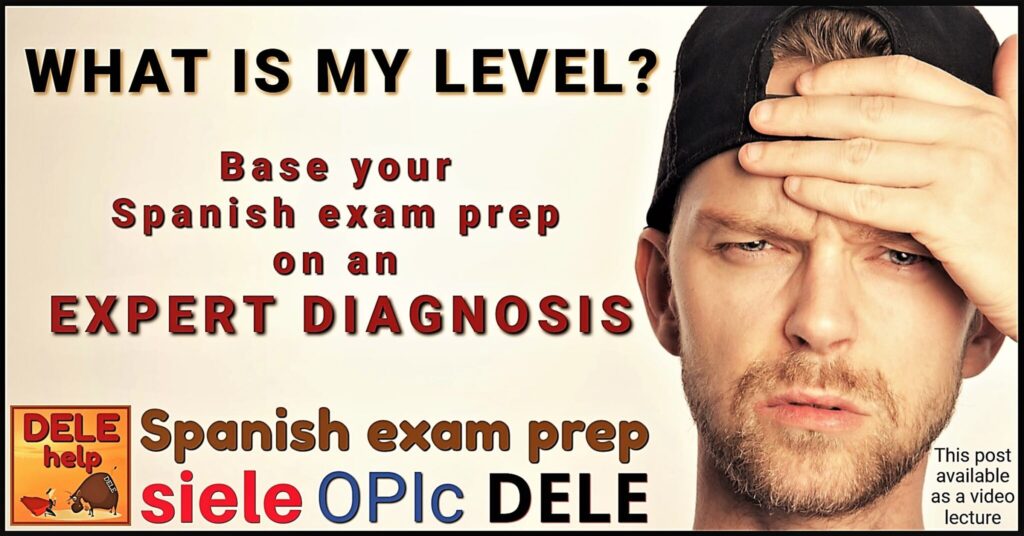THE ORAL TEST IS THE TOP PRIORITY IN SPANISH LANGUAGE EXAMS

ABSTRACT: Here’s further proof that the oral test is the top priority in Spanish language exams such as the DELE, the SIELE and the OPI / OPIc. The Spanish government, through the Instituto Cervantes, has introduced a version of the DELE A2 exam that is specifically designed for illiterate candidates who need to demonstrate A2 level communicative competency in Spanish for their nationality applications. This test is done exclusively orally, with a duration of 15 minutes.
What this development shows, is that all candidates for all kinds and levels of DELE, SIELE and OPI / OPIc exams should realise that the oral test is the top priority in Spanish language exams. Because it tests all four of the communicative competencies that form the assessment criteria of these exams.
FOCUS KEYWORD: the oral test is the top priority in Spanish language exams
KEYWORDS: Examen DELE, SIELE, OPI / OPIc, Spanish oral exam, Spanish language tests, the oral test is the top priority in Spanish language exams
THE ORAL TEST IS THE TOP PRIORITY IN SPANISH LANGUAGE EXAMS
1. WHY IS THE DELE “A2-NA” AN IMPORTANT PRIORITY POINTER FOR ALL SPANISH LANGUAGE EXAMS?
You may well be asking: why is this guy writing a blog post about a test designed to be taken by illiterates? [Yes, I do understand that obviously those preparing for this particular test are not going to be able to read this post 😉 ]. Which is why I’m not going to go into the procedures and format of this particular version of the exam, called the DELE A2-NA. (The NA stands for “not alphabetised” – i.e., cannot read or write).
There is a very good reason why I’m writing this post for everybody currently preparing for a Spanish language exam such as the DELE, the SIELE or the American OPI / OPIc package of exams. In other words, exams based on the Common European Framework of Reference for Languages, which test actual real-world “COMMUNICATIVE COMPETENCY” rather than school or college-style tests of theoretical knowledge.
If you ever needed proof of the priority importance of the oral test (in relation to the reading and listening comprehension, and the writing test components of these exams) you have it here. A whole exam based just on the oral interaction. (Of course, if you are doing the OPI or OPIc – the Oral Proficiency Interview – then you are already familiar with the fact that such exams can be entirely oral-based).
The fact that the Spanish government is satisfied that a test as important as the assessment of language ability (which prospective new citizens need to pass before qualifying for Spanish nationality) can be done entirely orally, says a lot. Equally, the fact that the majority of American institutions that require of job-seekers, teachers and other professionals that they demonstrate their Spanish language ability are content with the Oral Proficiency Interview alone (and don’t typically insist on the other “legs” of that exam, such as the writing, reading, and listening proficiency tests), is confirmation of the importance of oral ability.
It is evident that the form of communication most used in the real world, is the spoken word. Therefore, since oral communication is the basis of engaging with the world which you move in, it stands to reason that the oral test is the top priority in Spanish language exams.
2. The oral test allows assessment of all four of the components of “communicative competency“
To understand why the oral test is so valuable as an assessment tool for examiners, one must look at the components that together make up one’s real-world competency to communicate. These four components are: coherence; fluency; adequacy of linguistic scope; and accuracy of language use. They form the equally weighted assessment criteria used to score you in these exams, i.e., each criterium counts for 25% of your score. What do they each mean?
2.1 Coherence
Bluntly put, coherence means your ability to make sense. To be understandable. Communication is all about messaging. Can you formulate and convey a message that your listener can easily and accurately comprehend the meaning of?
You will know from own experience that a conversation is a very good context for assessing whether someone can actually use effectively a foreign language in everyday situations. You can (if you are the examiner) very quickly pick up whether the candidate can express him/herself coherently – enough so, for you to understand the intended message. As examiner, you can also easily assess whether the candidate has understood your questions (has listening comprehension) because of course a conversation is a two-way street.
2.2 Fluency
It is obvious that conversation is the self-evident best way to assess a candidate’s ability to fluently convey his/her message. Which is why conversation is such an important part of the oral test. Fluency forms another 25% of your assessment. The reason for this importance, is that a halting, broken conversation – one which doesn’t flow as one interlinked, un-interrupted chain of logically developed and associated message bits – will fail as message. Because its meaning will become fragmented and jumbled (and the listener, distracted to boot).
It is always striking to me that a full 50% of the oral test score is based on fluency and coherence.
Which means that, unlike school, theoretical knowledge of grammar is significantly less important in the scoring of these very real-world, practical exams of one’s competency at communicating (although it is obviously still very important to master grammar).
2.3 Adequacy of linguistic scope
What this technical term means, is simply whether you have a sufficiently ample vocabulary and stock of mastered idiomatic expressions and collocations (everyday word combinations) readily at your disposal.
Having such an internalised lexis (meaning vocab, expressions and collocations) at the ready is essential to allow you to formulate your message clearly. So that you can respond instantaneously, with coherence and fluency, in the to-and-fro of conversation.
Again, the oral test gives far better insight into your ready-to-use internalised “database” of Spanish words and expressions than would for example a writing test, where you have time to scratch your memory. As with the other three criteria, the core issue that’s being assessed, remains the efficiency of you messaging – and, if you cannot readily find the right words, then obviously your messaging will suffer (particularly if you use the wrong word, or you simply cannot come up with the right word at all).
2.4 Accuracy of language use
This criterium is also fundamentally linked to whether your message is capable of being understood with clarity. In the oral test, it assesses two main aspects: whether you are accurately using the patterns (grammar) of the language, and secondly, whether you pronounce correctly enough to be easily understood.
It is important to understand, though, that you’re assessed functionally, not from the perfectionist school-style viewpoint. You’re not going to be marked down a point for every little technical error.
What the examiners are under strict instructions to do, as regards pronunciation, is to ask themselves: can we figure out which word the candidate is actually trying to use, even if not 100% idiomatically pronounced? (There is no prescribed “correct” accent – all are accepted – so that you do not need to try and sound like Madrid high society).
Similarly, when it comes to grammar, the examiners are obliged to ask themselves: can we figure out in which timeframe the candidate wants to place events that he/she is relating (i.e., past, present, future etc.) in terms of the grammatical structures the candidate is using? If your meaning is clear, then you will not be penalised for little slip of the tongue technical errors in grammar.
Because, just as in real life, what is important is whether the meaning of your message is clear, even if it suffers from some inaccuracies. (But please don’t take this is signifying that grammar isn’t important – it’s just not the be-all and end-all that it is in typical school or college exams, and your study plan therefore needs to encompass much, much more than mastering grammar).
Given that the oral test is the top priority in Spanish language exams, and that coherence and fluency form 50% of that score, it is imperative that you should include in your study plan significant time for expertly guided oral practice – because fluency and coherence can only be perfected through PRACTICE, not through studying books.
2.5 In a nutshell…
Put in other words: the oral test is an opportunity to shine, but it can also be a harsh revealer of your inadequacies in all aspects of the use of the language.
It is therefore not surprising that, of all students who fail their DELE exams, statistically the vast majority who failed did so because of failing the oral test (71% of all overall failures are ascribed to having come up short in the oral).
If you want to learn more about how these exams of “Communicative Competency” are scored, have a look at this free YouTube lecture I recently did on the topic:
https://www.youtube.com/watch?v=aELQ6XFeJic

3. So, what to do about it?
Since my explanation above has hopefully convinced you that the oral test is the top priority in Spanish language exams, the next logical question is: what’s the best way of improving one’s spoken Spanish?
To understand the what and how of this challenge, one must comprehend how the human brain works, when it comes to language.
3.1 Do we “learn” a language, or do we “acquire” it?
Since you clearly are keen to do well in your Spanish oral exam, I’m assuming that you are ready to put in the time and effort to master speaking the language well. But how best to do it? What do we now understand, about how our brains actually go about the task of helping us acquire language?
And there, already, lies the first key concept we need to comprehend. What scientists have lately conclusively demonstrated, is that we actually acquire language, we don’t learn it.
Why this is so, is due to the two principal brain circuits involved in getting on top of any skill or knowledge set that we need to master: they’re called the procedural and the declaratory circuits. The latter is the one we use when we memorise things – what we traditionally call learning (studying), like in school or college. You learn a knowledge-based subject such as History, for example. You do not acquire it. Therefore, for memorising knowledge sets, we use the declaratory circuit of our brains to stock our “data bank” with information.
On the other hand, “acquire” is the term that scientists use for mastering the kind of subjects that require more than just book knowledge. Those skill sets where the core objective is not to merely reproduce knowledge, but to actually physically perform some skill set. In other words, acquiring the ability TO DO, not just know.For this we need to master procedures. Naturally, therefore, with the help (principally) of the procedural circuit – although there may also be some memorisation involved.
What we now clearly understand, is that all living languages that we wish to actually use in real-world situations, are performance subjects. You have to actually DO it, not just know it. Just like playing the piano, or painting, or doing ballet, making pottery and the like, language is something that you physically DO. Particularly in its most fundamental form, which is when you speak, as part of conversation.
What we know today, with great certainty, about the brain’s functioning when it acquires the skill to do something via its procedural circuit, is that the key to such mastery is practice, practice and more practice. Truly a case of “practice makes perfect”.
Like athletes say, you have to “build muscle memory”. The reason for this is that you need to internalise that ability to instinctively, reflexively speak, without really consciously thinking about its mechanics (like you do when you converse in your mother tongue). It comes reflexively, because you’ve already ingrained the lexis and the patterns of your mother tongue through frequent, repetitive practice (if you think about how toddlers acquire their mother tongue, you will know why scientists say they acquire it through practice – not by academically studying it at that tender age, of course).
Here’s another video lecture of mine, which gives a bit more detail about how the human brain picks up languages: https://www.youtube.com/watch?v=IcweD8Mt5TU

3.2 The keys to effective oral practice
There are certain fundamentals that one must keep in mind, when setting about practicing one’s spoken Spanish. Especially when you are considering doing it on your own.
The first thing to understand is the real risk (if you’re not expertly guided) of internalising WRONG patterns of language use. Imbedding in your memory language patterns that are wrong, is as easy as imbedding accurate usage! The big problem then, is how to get rid of those imbedded wrong ways of saying things that your brain and tongue have become accustomed to… ( ¡es muy difícil! ).
If you don’t ensure expert guidance that’s able to correct your inaccuracies, you are likely to fall into this trap of internalising the wrong grammar constructs, or wrong pronunciation, or use of the wrong word or expression. Think again about the example of the top athletes. They invest in coaches for this precise reason – to be expertly guided and corrected, so as not to form bad habits.
Practicing oral usage of a foreign language isn’t something that you can do all by your own through self-study, in front of the mirror!
However, saying that one acquires a language fundamentally through guided practice, does not mean that there is no place for the declaratory circuit and old-style learning. Things like expanding and mastering lexis (vocabulary, expressions and collocations) will certainly benefit from studying and memorisation. But even here, there are better ways of doing it than rote learning, such as old-style memorising of word lists. We advise that you use modern digital flashcards, so that you learn and exercise your recall and comprehension at the same time.
Another peculiarity of the brain to keep in mind, is that we tend to hear ourselves speak not via our ears, but via our brains – we “hear” that which we intended to say, not what (and how) we actually did say it. Therefore, it is very important during practice to record yourself, so that you can hear how it actually came out of your mouth (not as you wishfully imagined it to have emerged).
This is one of the reasons why our one-on-one coaches will record your practice sessions – the other reason is that such a methodology of recording and subsequent review, avoids interrupting the student in mid-flow (which breaks the fluency we need to foster). It also allows time at the end to properly identify and review errors, in order to explain and rectify (which is something that simply interjecting, as and while a practice conversation unfolds, cannot hope to accomplish – it will more than likely merely distract the student).
The last thing to keep in mind is that oral conversation practice should be real-world and realistic, simulating accurately the type of situation you will encounter in the exam itself. There are very many Spanish language coaches available on the internet. However, rather few of them are in actual fact properly familiar with the workings and goals of the DELE, the SIELE and the OPI. So, just as you would likely not go with a football coach when your aim is to improve your tennis, it is advisable to turn to expert exam prep coaches for knowledgeable guidance in this specialist field. This way, you will build confidence and be at your relaxed best on exam day.
3.3 Have your level diagnosed
It is evidently also very important that you know, when you start your exam prep, what your current level is. That defines what you need to be focusing on in your study plan, to get from where you are to where you need to be. This requires a proper DIAGNOSTIC (which we do free for our students, so that we can prepare an appropriate individualised study plan for each). Check out our DELEhelp blogpost about the diagnostic – CLICK HERE

Only by using a specialist exam prep coach who is familiar with the ins and outs of the DELE, can you ensure a valid diagnostic, as well as exam relevance and proper guidance in your coaching sessions. Your coach must know way more about these exams than just their superficial aspects, such as their format. It is critical that your coach be familiar with the didactical goals these exams are designed to achieve, as well as the curricula, the assessment criteria used, and the scoring system.
Very few language teachers have real in-depth knowledge and understanding of what these examiners are looking for (which is very different from school or college exams!). For you to prep properly, both you and your maestra need to know and understand the assessment criteria against which your performance will be measured, how your score will be calculated, and what the curricula for each level requires of you to know and be able to do. (If you yourself want to become more familiar with these very important aspects – so that you may know what your examiners are actually looking for – please ask for our free sample exam prep workbooks).

To ask for our free sample workbooks, simply CLICK HERE
¡Buena suerte! with your exam prep

To visit the website of our online language institute, please CLICK HERE
